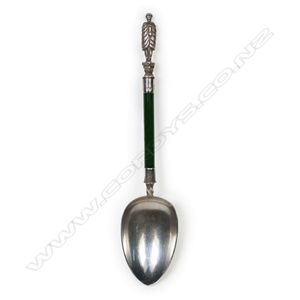Maori-themed silver and greenstone spoon by Frank Hyams
Frank Hyams (Dunedin) silver and greenstone Maori themed spoon, the finial as a standing Maori man wrapped in a cloak holding a mere, pounamu cylinder stem and large bowl. English hallmarks dating to Birmingham 1899. Stamped maker's mark.
You must be a subscriber, and be logged in to view price and dealer details.
Subscribe Now to view actual auction price for this item
When you subscribe, you have the option of setting the currency in which to display prices to $Au, $US, $NZ or Stg.
This item has been sold, and the description, image and price are for reference purposes only.
- Finial - An architectural decoration, found on the upper parts of of an object. On furniture they are usually found on pediments, canopies and shelf supports. On smaller ceramic or silver items, such as spoons, they may decorate the top of the item itself, or the lid or cover where they provide a useful handle for removal.
Finials have a variety of shapes and forms. They may be urn-shaped, baluster shaped round or spiral, but usually taper into an upper point. Many real life shapes may also be used as finials, such as pineapples, berries, pinecones, buds, lotus and acorns. Sometimes animals such as a lion are depicted, or fish and dolphins. - Frank Hyams Ltd. - Frank Hyams purchased a jewellery business in Princess Street Dunedin in 1885. As well as a manufacturing jeweller, he was a silversmith and goldsmith and specialised in jewellery incorporating New Zealand greenstone. At the New Zealand and South Seas Exhibition in 1890 he secured "first order of merit" for the manufacture of gold, gem and greenstone jewellery.
Concurrent with his Dunedin store, in 1902 Frank Hyams registered a limited company, Frank Hyams Ltd., and established a business in London, at 167 New Bond Street, and later at 128 New Bond Street, London, trading as 'artistic jewellers, gold and silversmiths, and dealers in gems of rarity'.
Frank Hyams established a reputation within the English aristocratic and upper class social circles for his unique one-off curiosity pieces incorporating materials and design influences from his New Zealand homeland.
The British Museum has a collection of 36 badges manufactured by Frank Hyams Ltd., circa 1906.
According to the London Gazette, in 1913 at an Extraordinary General Meeting it was voted that the company be voluntarily wound up and Frank Hyams was appointed liquidator. - Marrow Spoon - A spoon with a long handle and a narrow scoop shaped bowl, used to scoop and eat marrow from the hollow centre of roasted bones. Some marrow scoops are double ended with a different shaped bowl at each end.
- Hallmarks - A mark stamped on articles of precious metals in Britain, since the 14th century, certifying their purity. It derives its name from the Guild Hall of the Goldsmiths' Company, who recieved its Charter in 1327 giving it the power to assay (test the purity) and mark articles of gold and silver.
The hallmark will consist of several marks, including the:
- silver standard mark, indicating the purity of the metal. Sterling silver is .925 pure silver.
- the city mark indicating the city in which it was assayed eg London, Birmingham, York etc.
- the date mark, usually a letter of the alphabet in a particular font and case,
- a duty mark, indicating whether duty had been paid to the crown, and only in use from 1784 to 1890
The piece may include an additional mark, the maker's mark, although not forming part of the hallmark, will be located in the vicinity of the hallmarks.
Sometimes silver plated items will bear faux hallmarks, often confusing those not familiar with silver markings.
This item has been included into following indexes:
